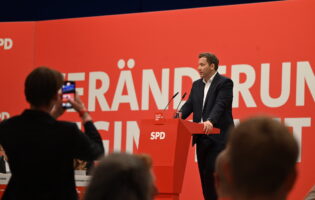The Implications of a Diplomatic Kerfuffle

Hannah Morris
Hannah Morris, a native of Houston, TX, currently works at J Street as the Associate Regional Director for the South. In 2015, she earned a M.A. in German and European Studies from Georgetown’s School of Foreign Service, where she focused on German-Israeli relations and wrote a thesis comparing the special relationships Israel shares with the U.S. and Germany. She also served as a graduate intern at the U.S. Department of State in the Office of Central European Affairs and as an AJC Goldman Fellow in Warsaw, Poland. Prior to moving to D.C., Hannah worked in New York City at Big Tent Judaism and taught English in Vienna. A graduate of Northwestern University, Hannah now serves on the AJC ACCESS DC board and will be starting a fellowship with Jews United for Justice later this year.
She is a 2016-2017 participant in AICGS’ project “A German-American Dialogue of the Next Generation: Global Responsibility, Joint Engagement,” sponsored by the Transatlantik-Programm der Bundesrepublik Deutschland aus Mitteln des European Recovery Program (ERP) des Bundesministeriums für Wirtschaft und Energie (BMWi).
At the end of April, Germany’s foreign minister Sigmar Gabriel traveled to Israel to pay his respects on Holocaust Remembrance Day at Yad Vashem, the Holocaust museum overlooking Jerusalem. Rather than a perfunctory visit, however, Gabriel’s trip spurred a diplomatic kerfuffle. News emerged that Gabriel planned to meet with two human rights groups, B’Tselem and Breaking the Silence, both of which have been painted as traitorous by Israel’s right due their criticism of Israeli government policies, championing of Palestinian rights, and international donor base.
Rather than express disapproval at a private meeting, Israel’s prime minister issued a public ultimatum: if Foreign Minister Gabriel chose to follow through with the meetings, he would not meet with him. In the end, Gabriel honored his scheduled meetings with the human rights groups, and in the blink of a news cycle, Israel and Germany’s diverging worldviews regarding the role of civil society and political dissent came to the fore.
While there were valid concerns about FM Gabriel’s meetings—Noga Tarnopolsky rightly noted that a foreign minister’s job is not to provoke an ally—these groups have been important voices engaging in Israel’s political discourse. They actively monitor human rights violations in the occupied territory and raise concerns about the threats the occupation poses for Israel’s future.
So, Netanyahu’s choice to shut down dialogue, as well as chastise both the German foreign minister and the human rights groups did not sit well with Germans. Indeed, when Germany’s president Frank-Walter Steinmeier visited Israel just two weeks later, he said the following at a lecture at Hebrew University: “I believe that civil-society organizations which are part of the social debate deserve our respect as democrats, even when they take a critical view of a government—in Germany, but also here in Israel.” Making the case that diverse voices are “oxygen of democracy,” Germany’s president highlighted the increased tendency among Israeli Knesset members and government ministers to demonize and squash political dissent.
For example, while editorial boards around the world portrayed Netanyahu’s choice as petty and illiberal, Netanyahu’s right-wing rivals and political base in Israel publicly backed his decision. This domestic Israeli response reflects an inward, nationalistic worldview shared by a segment of Israelis that, as the New York Times Editorial Board notes, views “critics as enemies” and pits Israel against the world.
And while this diplomatic dispute is one that only the closest observers of Israeli politics might have noticed, it is part of a trend that raises questions as to the health of Israeli civil society and what role, if any, international governments and civil groups abroad should play in promoting a healthy one. Part of the very discomfort among Israelis with these human rights groups so critical of Israel is the fact that they are funded by the EU and international donors. Should that then preclude groups such as the American Civil Liberties Union or Humanistische Union from working together to help and train groups such as B’Tselem?
It is possible that forming German-American coalitions to help Israeli human rights groups fight back against their marginalization could cause Netanyahu and his allies to retrench. Yet, the current political climate threatening the liberal international order and democratic norms will require non-state actors to join forces to protect them.
Indeed, with Trump’s “America First” agenda guiding U.S. foreign and domestic policy—an approach that has led German chancellor Angela Merkel to publicly assert that the U.S. is no longer be a “reliable” partner—U.S. civic engagement has exploded. While there are myriad issues with which to engage, there will always be Americans passionate about strengthening Israeli democracy and ending the conflict with the Palestinians. German citizens need to see that, embrace that, and offer their hand. The opportunity to work together could not only help Israelis, but also help each other in this dark era for democracy.









